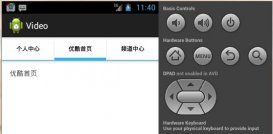本文实例为大家分享了Android自定义控件ViewGroup实现标签云的具体代码,供大家参考,具体内容如下
实现的功能:

基本绘制流程:
构造函数获取自定义属性
onMeasure()方法,测量子控件的大小
onLayout()方法,对子控件进行布局
1、自定义属性
|
1
2
3
4
5
6
7
8
|
<resources> <declare-styleable name="TabsViewGroup"> <attr name="tabVerticalSpace" format="dimension" /> <attr name="tabHorizontalSpace" format="dimension" /> </declare-styleable></resources> |
2、构造函数中获取自定义属性值
|
1
2
3
4
5
6
7
8
9
|
public TabsViewGroup(Context context, AttributeSet attrs) { super(context, attrs); TypedArray attrArray = context.obtainStyledAttributes(attrs, R.styleable.TabsViewGroup); if (attrArray != null) { childHorizontalSpace = attrArray.getDimensionPixelSize(R.styleable.TabsViewGroup_tabHorizontalSpace, 0); childVerticalSpace = attrArray.getDimensionPixelSize(R.styleable.TabsViewGroup_tabHorizontalSpace, 0); attrArray.recycle(); } } |
3、onMeasure函数测量子控件大小,然后设置当前控件大小
|
1
2
3
4
5
6
7
8
9
10
11
12
13
14
15
16
17
18
19
20
21
22
23
24
25
26
27
28
29
30
31
32
33
34
35
36
37
38
39
40
41
42
43
44
45
46
47
48
49
50
51
52
53
54
55
56
57
58
59
60
61
62
63
64
65
66
67
68
69
70
71
72
73
74
75
76
77
78
79
80
81
82
|
@Override protected void onMeasure(int widthMeasureSpec, int heightMeasureSpec) { int widthSize = MeasureSpec.getSize(widthMeasureSpec); int heightSize = MeasureSpec.getSize(heightMeasureSpec); int widthModel = MeasureSpec.getMode(widthMeasureSpec); int heightModel = MeasureSpec.getMode(heightMeasureSpec); //输出宽度高度以及测量模式 Log.i(TAG, "sizeWidth :" + widthSize); switch (widthModel) { case MeasureSpec.AT_MOST: Log.i(TAG, "Width model AT_MOST"); break; case MeasureSpec.EXACTLY: Log.i(TAG, "Width model EXACTLY"); break; case MeasureSpec.UNSPECIFIED: Log.i(TAG, "Width model UNSPECIFIED"); break; } Log.i(TAG, "sizeHeight :" + heightSize); switch (heightModel) { case MeasureSpec.AT_MOST: Log.i(TAG, "Height model AT_MOST"); break; case MeasureSpec.EXACTLY: Log.i(TAG, "Height model EXACTLY"); break; case MeasureSpec.UNSPECIFIED: Log.i(TAG, "Height model UNSPECIFIED"); break; } //左右边距 int left = getPaddingLeft(); int top = getPaddingTop(); //记录每一行的宽度和高度 int lineWidth = 0; int lineHeight = 0; // 如果是warp_content情况下,记录宽和高 int containerWidth = 0; int containerHeight = 0; // 遍历每个子元素 for (int index = 0; index < getChildCount(); index++) { View child = getChildAt(index); if (child.getVisibility() == GONE) { continue; } measureChild(child, widthMeasureSpec, heightMeasureSpec); MarginLayoutParams params = (MarginLayoutParams) child.getLayoutParams(); int childWidth = child.getMeasuredWidth() + params.leftMargin + params.rightMargin + childHorizontalSpace; int childHeight = child.getMeasuredHeight() + params.topMargin + params.bottomMargin + childVerticalSpace; if (lineWidth + childWidth > widthSize - getPaddingRight() - getPaddingLeft()) { containerWidth = Math.max(lineWidth, childWidth); lineWidth = childWidth; containerHeight += lineHeight; lineHeight = childHeight; Rect rect = new Rect(left, containerHeight + top, left + childWidth - childHorizontalSpace, containerHeight + top + child.getMeasuredHeight()); child.setTag(rect); } else { Rect rect = new Rect(lineWidth + left, containerHeight + top, lineWidth + left + childWidth - childHorizontalSpace, containerHeight + top + child.getMeasuredHeight()); child.setTag(rect); lineWidth += childWidth; lineHeight = Math.max(lineHeight, childHeight); } } containerWidth = Math.max(containerWidth, lineWidth) + getPaddingLeft() + getPaddingRight(); containerHeight += lineHeight + getPaddingTop() + getPaddingBottom(); containerHeight -= childVerticalSpace; setMeasuredDimension(widthModel == MeasureSpec.EXACTLY ? widthSize : containerWidth, heightModel == MeasureSpec.EXACTLY ? heightSize : containerHeight);} |
4、onLayout函数对所有子控件重新布局
|
1
2
3
4
5
6
7
8
9
10
11
12
|
@Override protected void onLayout(boolean changed, int l, int t, int r, int b) { int childCount = getChildCount(); for (int i = 0; i < childCount; i++) { View child = getChildAt(i); if (child.getVisibility() == GONE) { continue; } Rect location = (Rect) child.getTag(); child.layout(location.left, location.top, location.right, location.bottom); }} |
使用方法
1、布局问自己中直接引用
|
1
2
3
4
5
6
7
8
9
10
11
12
13
14
15
16
17
18
19
20
21
22
23
24
25
26
27
28
29
30
|
<?xml version="1.0" encoding="utf-8"?><LinearLayout xmlns:android="http://schemas.android.com/apk/res/android" xmlns:owen="http://schemas.android.com/apk/res-auto" android:id="@+id/activity_main" android:layout_width="match_parent" android:layout_height="match_parent" android:background="#ffffff" android:orientation="vertical"> <TextView android:layout_width="wrap_content" android:layout_height="wrap_content" android:padding="10dp" android:textSize="16sp" android:text="国际足球"/> <View android:layout_width="wrap_content" android:layout_height="0.1dp" android:background="#e0e0e0"/> <com.ownchan.tabviewgroup.view.TabsViewGroup android:id="@+id/tabs_view" android:layout_width="match_parent" android:layout_height="wrap_content" android:padding="10dip" owen:tabHorizontalSpace="10dp" owen:tabVerticalSpace="10dp" /></LinearLayout> |
2、代码添加标签
|
1
2
3
4
5
6
7
8
9
10
11
12
13
14
15
16
17
18
19
20
21
22
23
24
|
@Override protected void onCreate(Bundle savedInstanceState) { super.onCreate(savedInstanceState); setContentView(R.layout.activity_main); initView(); } private void initView() { TabsViewGroup tabsViewGroup = (TabsViewGroup) findViewById(R.id.tabs_view); LinearLayout.LayoutParams params = new LinearLayout.LayoutParams(ViewGroup.LayoutParams.WRAP_CONTENT, ViewGroup.LayoutParams.WRAP_CONTENT); String[] tabs = new String[]{"世预赛欧洲区", "世预赛南美区", "五人世界杯", "意甲", "美国大联盟", "乌超", "英冠", "国际冠军杯", "巴西圣保罗州杯", "巴西杯"}; for (int i = 0; i < tabs.length; i++) { TextView textView = new TextView(this); textView.setText(tabs[i]); textView.setTextColor(Color.WHITE); textView.setBackgroundDrawable(getResources().getDrawable(R.drawable.tabs_bg)); textView.setGravity(Gravity.CENTER); textView.setPadding(10, 0, 10, 0); textView.setTextSize(16); tabsViewGroup.addView(textView, params); }} |
效果图:

项目Github地址
以上就是本文的全部内容,希望对大家的学习有所帮助,也希望大家多多支持服务器之家。
原文链接:https://blog.csdn.net/owenchan1987/article/details/59480006














